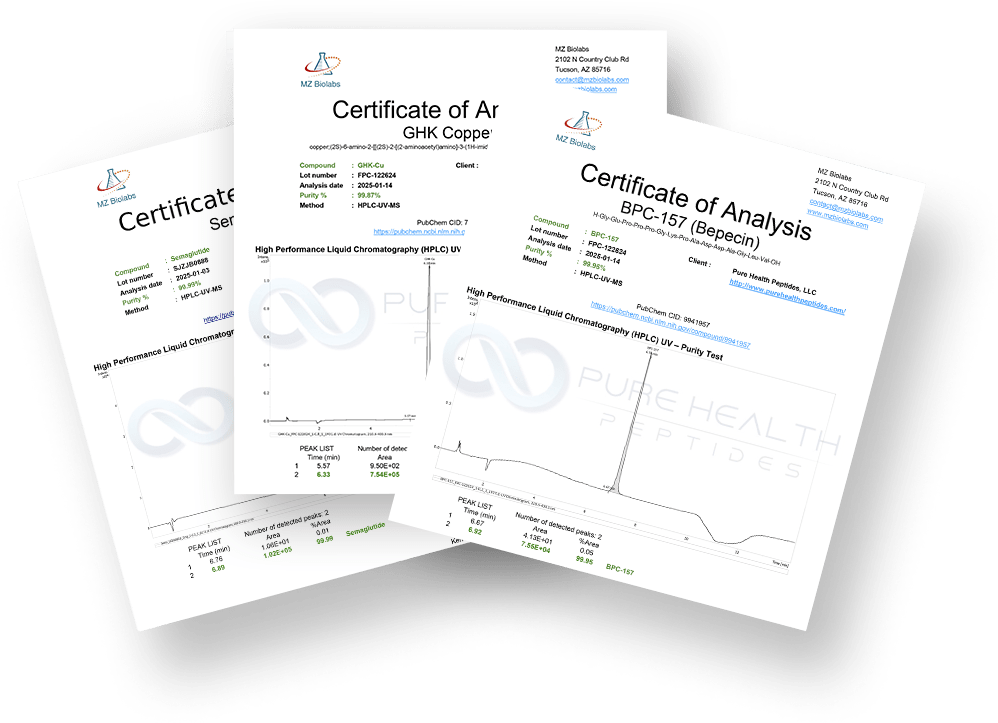Understanding Certificate of Analysis (COA) Standards
Ensuring Quality and Transparency in Peptide Testing
At Pure Health Peptides, we recognize the importance of reliable and trustworthy products for research purposes. Our commitment to quality extends beyond our peptides to the meticulous processes we use to verify their integrity. By working closely with our partners and understanding key testing criteria, we ensure that our products meet the highest standards, setting us apart from others in the industry.

1. Why Are COAs Important?
A Certificate of Analysis is a document that confirms the identity, purity, and quality of a peptide. It ensures that the product meets specific standards, making it critical for research integrity. Unfortunately, many COAs in the market are incomplete, lack critical data, or fail to meet industry standards, leaving researchers with unreliable results.
2. Differences Between High-End and Generic Testing
High-End Testing Methods and Equipment:
- HPLC (High-Performance Liquid Chromatography) – MZ Biolabs: HPLC is used by advanced laboratories to separate components of a peptide to detect even trace impurities with exceptional precision. Various detectors are used with HPLC including the popular UV detectors and mass spectrometers.
- UPLC (Ultra-Performance Liquid Chromatography) – Bio Regen
UPLC is an advanced chromatographic technique that builds on HPLC by offering:- Higher resolution and sharper peaks for enhanced impurity separation.
- Increased sensitivity, allowing for more precise low-level impurity detection.
- Faster analysis times, improving throughput while maintaining accuracy.
By incorporating both HPLC and UPLC methodologies, our testing partners ensure the highest level of analytical precision, setting a benchmark for peptide purity verification
- UV Radiation Testing: Both HPLC and UPLC use UV absorption technology to detect impurities in peptide formulations. Chromatograms generated from UV detectors provide a visual representation of compound separation, confirming purity levels and the presence of any contaminants.
- Mass Spectrometry (MS): Molecular Identity Confirmation
To further validate peptide composition, samples undergo mass spectrometry testing, ensuring molecular weights precisely match expected values. MS analysis, performed alongside HPLC or UPLC, confirms the authenticity and integrity of the compound.
Generic Testing Methods
Many low-cost-, non-standardized- or non-GMP certified peptide suppliers use outdated, generic methods that fail to ensure accuracy, leading to inconsistent or misleading purity claims by using generic methods, such as:
- Titration: A basic method for concentration determination, with limited ability to detect impurities.
- Infrared Spectroscopy (IR): Identifies molecular bonds but lacks precision for complex peptide analysis.
- Thin-Layer Chromatography (TLC): Useful for basic compound identification but inadequate for low-level impurity detection.
Processes and Procedures
- High-End Labs: Use sophisticated equipment, rigorous quality controls, and highly trained professionals. These ensure precision, reliability, and transparency in testing.
- Generic Labs: May rely on outdated techniques, simplified procedures, or limited expertise, increasing the risk of incomplete or inaccurate results.
3. How to Read and Interpret a COA
Key Data to Look For
- Testing Methodology: Verify that the COA specifies high-end methods like HPLC, UV radiation testing, and MS. These methods ensure the highest level of precision and reliability.
Purity - Percentage: Check for clear reporting of purity levels, ideally supported by chromatograms and impurity breakdowns.
- Chromatograms: Look for graphs that illustrate the separation of compounds, showing distinct peaks corresponding to the peptide being tested. Peaks should be labeled with time and area percentages.
- Identity Confirmation: Ensure the molecular weight of the compound matches the expected value. For example, mass spectrometry data should provide both expected and measured monoisotopic masses.
- Certifying Authority: Confirm that the COA is signed by a qualified chemist or analyst, adding credibility and accountability to the results.
Red Flags in a COA
- Missing or vague descriptions of testing methods.
- Lack of chromatograms or visual data supporting the purity claims.
- Discrepancies in reported purity percentages from different labs.
- Unsigned or undated certificates.
By thoroughly reviewing these key data points, researchers can ensure they are working with reliable products.
4. What Makes Pure Health Peptides Stand Out?
At Pure Health Peptides, we go the extra mile to ensure the quality and reliability of our products. Unlike others in the industry, we:
- Collaborate with MZ Biolabs and Bio Regen, both laboratories that meet the same high standards we uphold. Their use of advanced testing methods like UPLC, HPLC, UV, and MS ensures our products are tested with precision and transparency.
- Ensure all products are tested using advanced methods and include detailed data such as chromatograms, impurity breakdowns, and molecular confirmations.
- Proactively address industry challenges by prioritizing comprehensive and reliable certification processes.
We chose to partner with MZ Biolabs and Bio Regen, because their commitment to rigorous testing aligns with our values, and their standout practices mirror our dedication to delivering excellence.
5. How We Educate and Empower Researchers
To help researchers navigate the complexities of COAs and testing:
- We Share Insights: Using examples, we highlight what to look for in a COA, including key data points and common red flags.
- We Lead by Example: By ensuring our COAs are complete, transparent, and meet stringent criteria, we set a benchmark for the industry.
- We Advocate for Better Standards: Our commitment to understanding and addressing testing challenges positions us as a trusted partner in the research community.
6. Partnering for Excellence
By partnering with MZ Biolabs and Bio Regen, we ensure that our products are tested and certified to the highest standards. This collaboration reflects our shared commitment to quality, transparency, and reliability. At Pure Health Peptides, we don’t just provide peptides – we provide verifiable research quality.